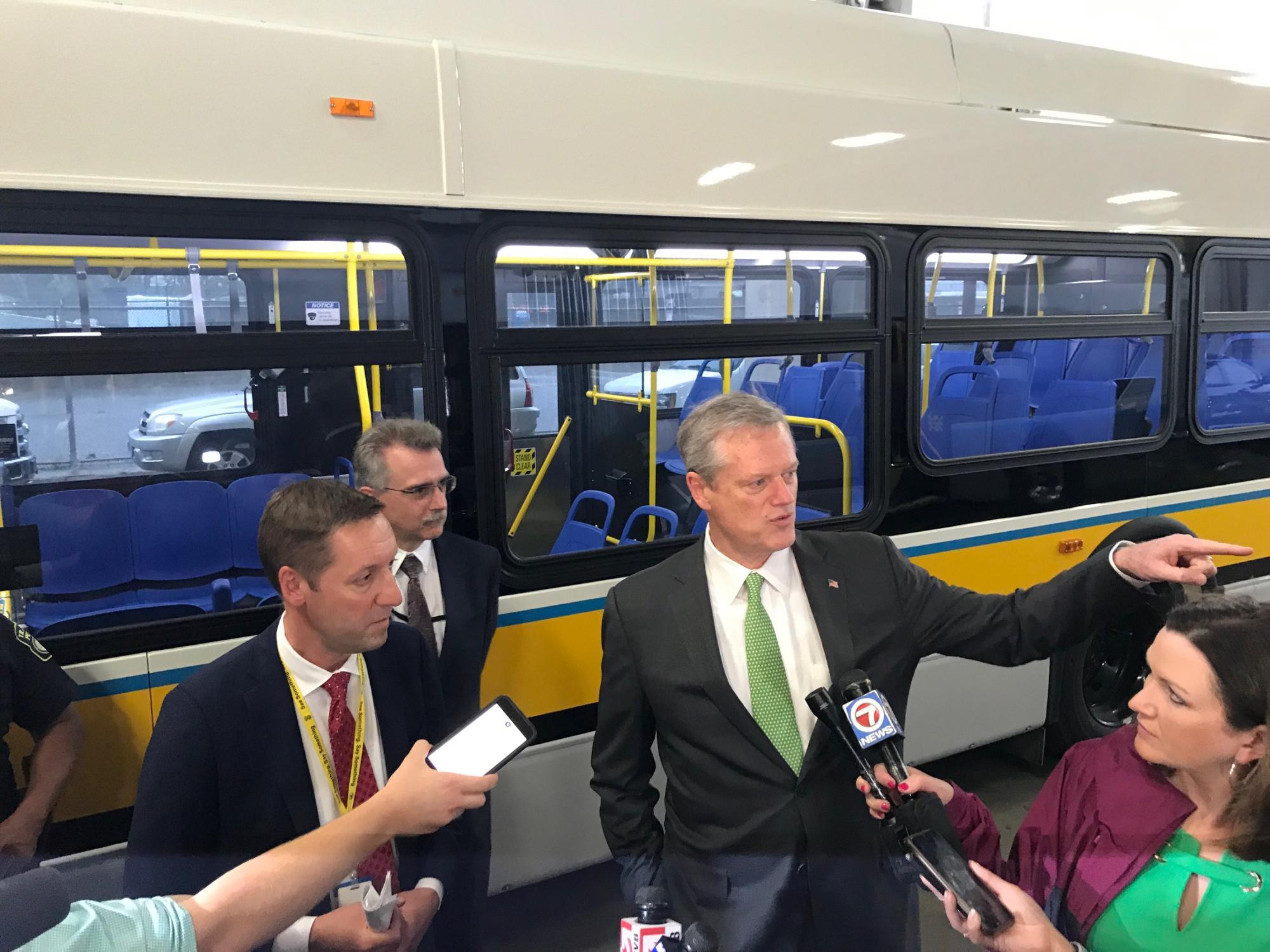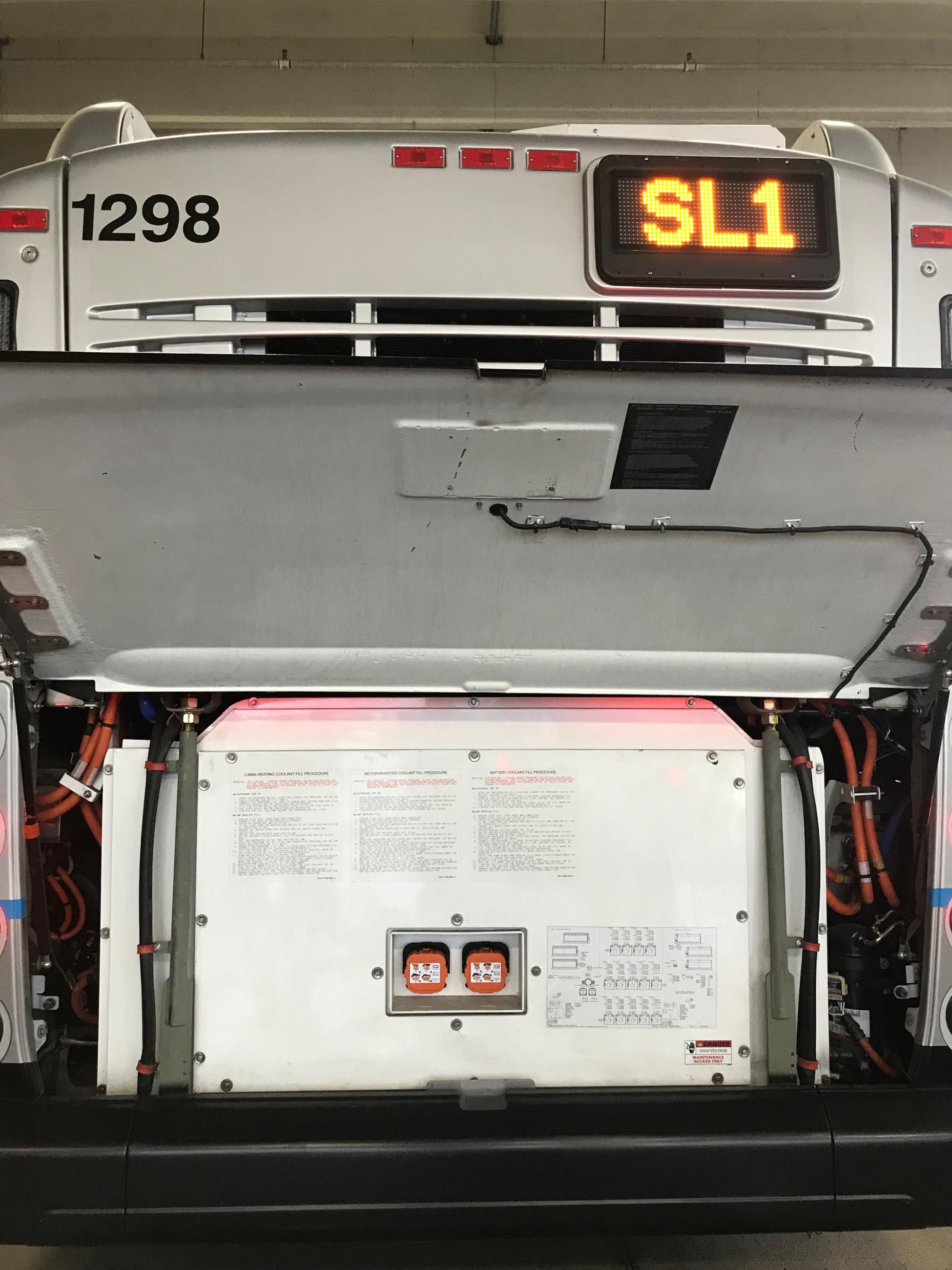First Zero-emission, Battery-electric Buses Join the MBTA Silver Line Fleet
Posted on July 31, 2019
3 of 5 zero-emission bus prototypes going into service today, 2 more to follow soon.
Today at the Southampton Bus Garage and Maintenance Facility, Governor Charlie Baker, MassDOT Secretary and CEO Stephanie Pollack, and MBTA General Manager Steve Poftak gathered to celebrate the introduction of the MBTA's first brand new, zero-emission, battery-electric bus (BEB) prototypes into the MBTA's Silver Line fleet.
“The procurement and testing of new battery-electric bus technology is exactly the type of investment we aim to continue with the Transportation Bond Bill in order to help the MBTA plan for the future,” said Governor Charlie Baker. “Our Administration will continue to explore ways to reduce greenhouse gas emissions in the Commonwealth’s transportation system and we look forward to more improvements as the MBTA makes progress on delivering a more reliable bus system.”
“Testing the operational capabilities of these zero-emission prototypes by the MBTA is part of the Commonwealth’s commitment to reducing emissions in a changing climate,” said Lieutenant Governor Karyn Polito. “This emerging vehicle technology is something we hope to continue to explore with investments from the Transportation Bond Bill as the MBTA analyzes how these new buses can deliver better service.”
“These new zero-emission, completely battery-electric bus prototypes are an emerging technology aimed at providing a safe, reliable, comfortable ride while lowering energy costs and reducing dependence on fossil fuels,” said Transportation Secretary and CEO Stephanie Pollack. “We are pleased to take steps forward with the process of evaluating whether these kinds of new technologies that promote sustainability are appropriate for daily service for MBTA customers.”
“We’re excited to introduce these first battery-electric buses into service on the Silver Line to test how they operate in real-world conditions on Boston streets and in the Silver Line tunnel,” said MBTA General Manager Steve Poftak. “This is an exciting first step in testing new technologies to electrify our bus fleet, save on fuel costs, and reduce our maintenance needs. We look forward to seeing how these buses perform, gathering data on power consumption, and testing their range during extreme weather as we continue to seek ways to reduce greenhouse gases and improve service for our customers.”

With support from a $10 million federal grant, the MBTA procured from New Flyer the production of 5 zero-emission, battery-electric, 60-foot, articulated buses. All 5 are currently in Boston with the first BEB prototype having arrived in April 2019 to begin testing and operator training. Three BEBs are entering service today on Silver Line Routes SL2, SL3, SL4, and SL5, with the next 2 anticipated to enter service on these routes by the end of the summer.
Five charging stations are also being built within the Southampton Bus Garage and Maintenance Facility as part of the project where each BEB will be "refueled" overnight.
These BEBs are powered by both rear axle and center axle electric motors to enhance safe operation during the winter months. The majority of 60-foot low floor articulated buses in service in North America utilize only the rear axle to provide propulsion power by pushing the bus, which can experience traction issues during winter months when snow and ice are present. The performance of the BEBs’ axle placement will be one feature specifically tested and studied while in service.
The MBTA will also be one of the first systems to test 100% electric heat for comfortable onboard temperatures during winter months. Previously, U.S.-built BEBs operated diesel-fired auxiliary heaters.
With a commitment to vehicle efficiency, energy conservation, and sustainability, the MBTA continues to explore available technologies and new vehicles that are capable of zero-emissions operation in the Silver Line Transitway Tunnel, which serves the World Trade Center, Courthouse, and South Station stops. Innovative projects like the MBTA Silver Line Zero-Emission Bus Project directly reduce Greenhouse Gas (GHG) emissions and also help improve ridership by offering a quieter, emission-free transit experience.
During a 2-year period following the introduction of the BEBs into service, the MBTA will test and gather data on this emerging technology to measure BEB performance and operational effectiveness with a focus on power consumption of electric heaters, operator/passenger comfort, vehicle range impact during extreme conditions, charging requirements, and projected operating costs. The MBTA will operate these buses on Silver Line routes to measure the capabilities of the technology for consideration in future zero-emission bus procurements.
Over the past 4 years, the Baker-Polito Administration has invested unprecedented levels of funding for transit improvements that have included the purchase of hundreds of new buses as well as the purchase of hybrid vehicles:
- The MBTA has purchased 575 new buses with 381 already in service and 194 additional hybrid buses in production.
- More than one-third of the bus fleet was recently replaced. Once the additional hybrid buses are in service, more than half of all MBTA buses will be less than 5 years old. These new buses replace the oldest and least fuel-efficient vehicles in the fleet and provide a more comfortable ride for passengers.
- The piloting of these 5 zero-emission, battery-electric buses is also the first step in testing new technologies to electrify the fleet.
- In April 2018, the MBTA introduced the Silver Line 3-Chelsea service, providing a direct link between Chelsea and the Seaport District. This project was the first new MBTA service since the Greenbush Commuter Rail Line came online in 2017, with the $56.7 million project jointly funded by MassDOT ($7.6 million) and the MBTA ($49.1 million).
- Following positive results from a Transit Signal Priority (TSP) pilot, the FMCB approved plans to expand the T's TSP pilot to include broad corridors of the MBTA street-level system. TSP provides faster service to bus passengers by using signal technology to reduce dwell times for vehicles that operate in mixed traffic.
- As part of the Better Bus Project, the MBTA has partnered with cities and towns to implement dedicated bus lanes and queue jumps, resulting in faster trips for bus passengers. Bus lanes currently exist on Brighton Avenue in Allston, Washington Street in Roslindale, Massachusetts Avenue in Cambridge, Mount Auburn Street in Cambridge and Watertown, and Broadway in Everett.
The MBTA is currently investing more than ever before to upgrade its infrastructure under its current $8 billion, 5-year Capital Investment Plan already in place, and the Baker-Polito Administration’s Transportation Bond Bill includes approximately $5.7 billion for the MBTA to continue funding improvements.
The bond bill also includes a number of proposals to accelerate capital investments that include investments in the MBTA's bus system, including continued funding for the dedicated bus lanes, signal prioritization, bus shelters and other infrastructure; for sustainable transit system modernization investments to modernize the bus fleet and support the Better Bus Project; and for maintaining the bus fleet and operational improvements. There are additional provisions to allow for the use of design-build procurement for smaller projects, which reduces the timeline for delivering capital improvements, and job-order contracting, which is a faster, more cost effective way to address outstanding maintenance needs. The bill would also establish a process to leverage private-sector investment to fund and build transit improvements.
The provisions in the bond bill that seek to expedite the T's pace of investment come on the heels of the T’s plan to accelerate capital investments by exploring more aggressive closures overnight and on weekends, increasing the regimen of proactive inspections, negotiating with contractors to compress project schedules, augmenting the existing workforce with a flexible team that can provide necessary services such as flaggers, bus operators, and power, signal, and track personnel to support capital investments.
More Information
Media Contact Information
For all queries and comments, please contact:
Recent News on the T
December 16, 2024
December 13, 2024
December 9, 2024
December 6, 2024
